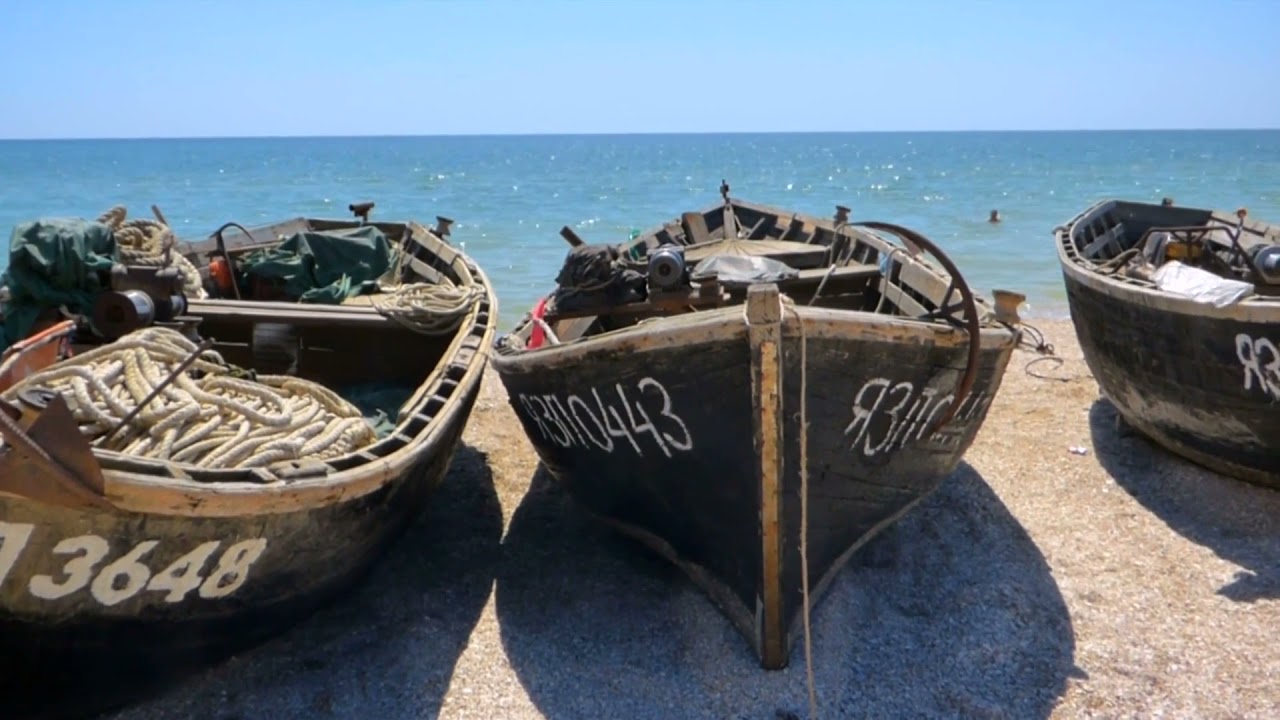As it has become a tradition that Young Reporters for Environment (YRE) International every spring arrange the global YRE-competition, YRE in Ghana call for a national competition to encourage, guide and select national participants for the global participation. The purpose is to encourage youth to be advocates for the environment by sharing educative stories either with a picture or photo series, a video or an article. just as it is pivotal that the next generation is informed and engaged in the conditions in which they are growing up in, we provide national and global platforms for their stories to be heard and seen by todays decision makers.
YRE is committed to the Sustainable Development Goals (SDGs) to promote them and present case stories of initiatives that are developed by local communities and emphasize a holistic approach to achieving sustainable development for all. Therefore, participants are encouraged to reflect on the link between their entry and one or more SDGs, while an environmental lens is always required, also when a social or economic SDG is chosen as a topic of investigation. Following alarming news about the need to take urgent action to save humans and the Earth, YRE have three priority topics for this years competition:
- Climate change
- Loss of biodiversity
- Pollution
The three winners of the national competition in Ghana each represents one of these topics.
First Price to Lincoln Community school for putting the spotlight on how illegal fishing is putting food security at risk
The overall winners of the 2021 YRE-Ghana competition is Ana Camila Newton and Selim Erims from Lincoln Community School who submitted a video where they have made the audios and pictures using different sources of information. Their focus is on SDG 14, Life under water, and the effect illegal fishing has on both society and biodiversity. You can find the winning video on our national you-tube channel YRE-TV:
A large portion of the Ghanaian population heavily relies on fish for their main source of protein and Ghanaians consume twice as much fish as other people anywhere in the world.
The fishing sector employs 10% of the entire population however, over reliance on specific fish species is leading to species depletion affecting fisher folks and consumers as well. Ana and Selim, students at Lincoln Community School has put together this educative video where we hear them focus on illegal fishing in Ghana and how it is affecting food security in the country. Their topic speaks to SDG14, Life under water but also other SDGs. Their video is informative addressing a very critical issue in the country and globally.
Anna and Selim will now be representing Ghana in the international YRE-competition in the video category age 15-18. we wish them all the best.
Second Price to David Kojo Dagadu: “The waste collecting women who is no waste”
David Kojo Dagadu (age 19) from Apeguso Senior High school was nominated by the Eco-School coordinator in his area Mrs Margaret Ayernor. Mrs Ayernor had a touching story about the women who collects the water sachets in her neighborhood which she wanted her students to cover. This is the story she shared with us accompanied by Davids photo series:
“A woman living in a suburb of Akosombo, was collecting the used water sachets bags at my house but she wanted to stop, because according to her, people were making fun of her because she was collecting the waste. So I encouraged her, and she continued. I packed mine neatly for her when she came to my house. (Photo number 1.)

Just before the covid she bought a piece of traditional cloth from the proceeds she realized from the sales of the used water sachets. The meaning of the pattern of the traditional cloth she bought is "You think I will be a waste". Because she had no job, people think she is useless and that is why when she got the money she decided to buy that particular cloth which has such a name. (Photo number 2).
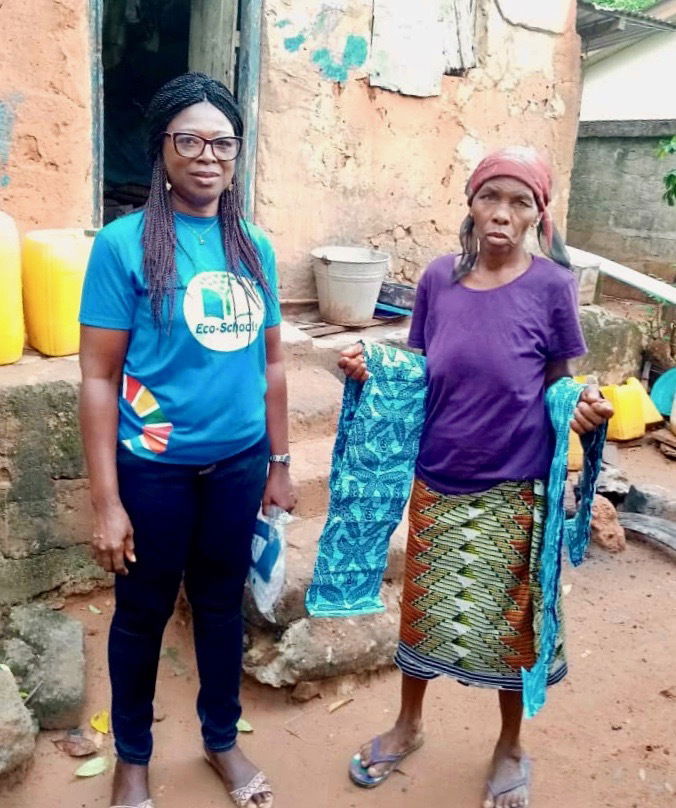
Because of the hard work she is doing to protect the environment I donated an Eco-Schools T-shirt. (Photo number 3).
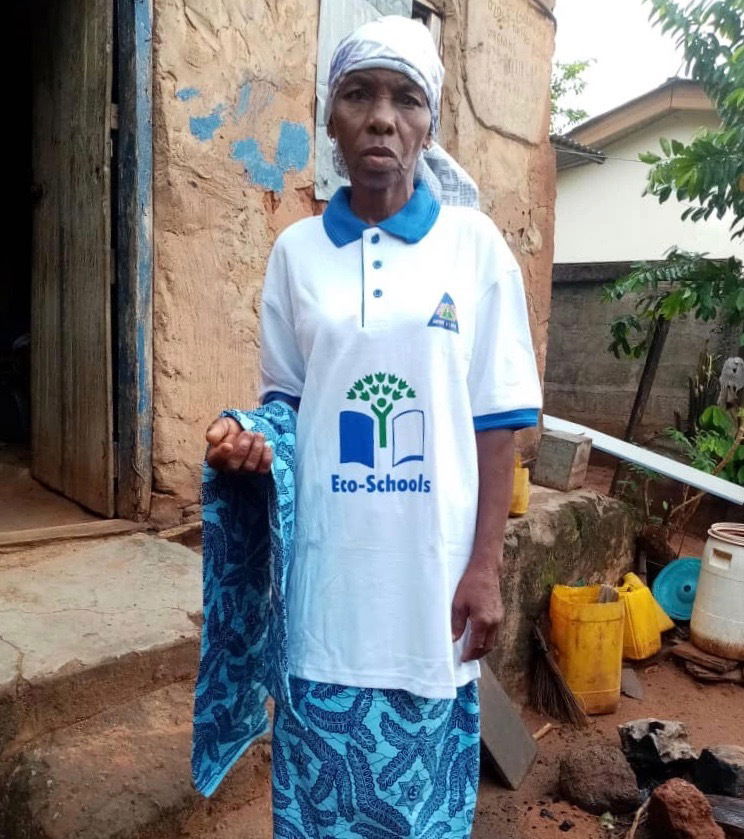
I educated the fishmonger that the plastic would kill the fish if it was not prevented from ending up in the water. The fishmonger women, who had started buying the plastics from them, now take the collected plastic waste to the recycling factories for the women that collect it. (Photo number 4).
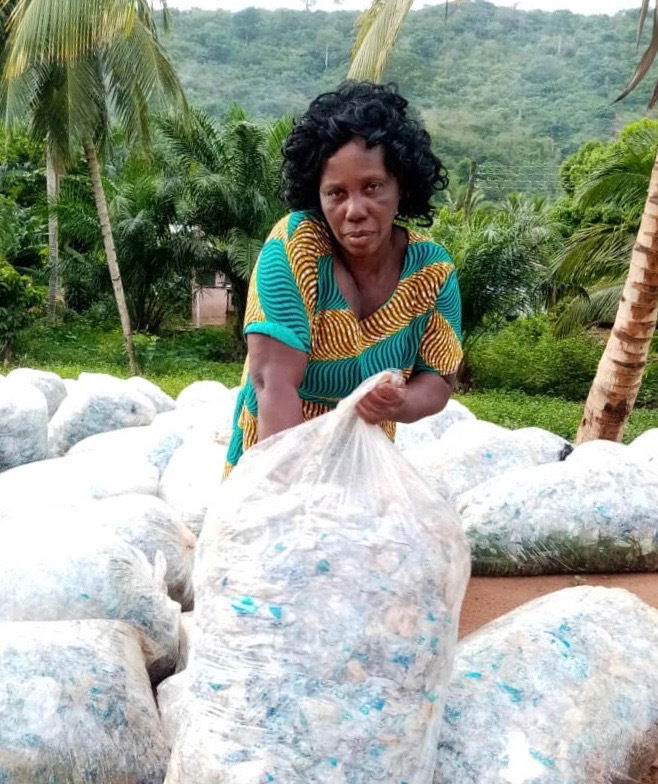
Now she has created a good market for the used sachets so more women are collecting. (Photo number 5).
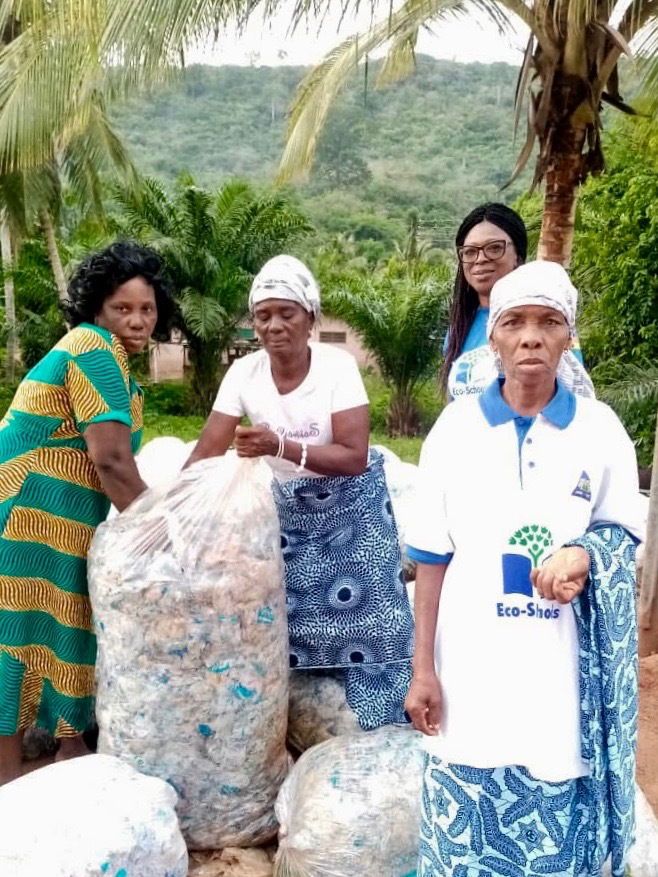
I tried organizing the students at Akosombo International School to cover their story with an article, but because of the COVID-19 situation at the school they were not allowed to leave the school's premises. Luckily David came along from Apeguso High School to take the photos. I am now planning to organize the waste pickers and form a Women Eco-Club in their locality where our Eco-Schools students can come and share their knowledge on the importance of good waste management with them when COVID-19 is over."
The story reflects on pollution of the environment and many of the SDG´s such as SDG 1, 4.7, 12,14 and 15. We congratulate David Kojo Dagadu with second place in the national TRE-Ghana competition. His photo story about the woman who collects the plastic waste from his teacher Margaret Ayerno´s house will represent Ghana in the international YRE-competition in the category Photoseries age 19-25+
Third Price to Gaten Agbaam at YRE for putting the struggle of Climate Justice into historical context
Gaeten Agbaam is an active member of YRE-Ghana and serves on our youth board. We first met Gaeten when he worked as an intern for UNDP and arranged for the interns to work as volunteers for our Eco-Schools program. He still works for UNDP and the SDG Accelerater-lab, but now with the YRE hat doing research and publications on plastic waste in Ghana. His submission to the competition, however, was on SDG 13 climate change - butting it in a historical context with this picture that came second in the national competition:

In 1957 Ghana played a pivotal role for freedom and justice for the people on the African continent, becoming the Black star of Africa. Today young people call for the Black star to take action on climate justice for the vulnerable people and nature on the continent. As part of the global movement "Fridays for Future Online» Gaeten Agbaam, stays in the roundabout under the iconic Freedom Arch in the capital Accra during rush hour with his plakat calling for climate justice - SDG 13 - visible for the traffic going to the ministries and the main market in tow. As seen in this picture that he also submitted:

Gaeten is wearing his traditional smock, as a symbol and inspiration to people to consume locally to reduce transport energy for products from abroad and at the same time create work locally.
Gaeten Agbaam will represent Ghana in the international competition in the category photo age 19-25 +
We cross our fingers and wish all our winners the best of luck in the international competition.
